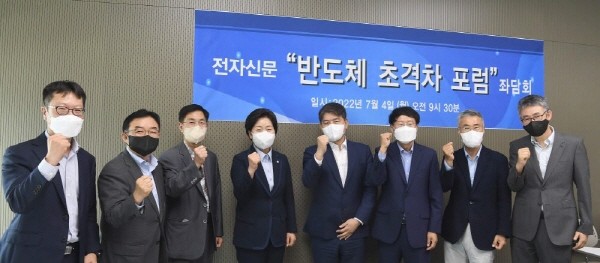ETNews' 'Semiconductor Super Gap Forum' discussion
Consistency in human resource development and corporate investment policies
Emphasis on 'Role of the National Assembly' to improve laws and syst

Opinion leaders in politics, government, industry, and academia agreed that a 'control tower' was needed to establish a strategy for Korea's semiconductor super-gap. They pointed out that the reason policies meant to foster the semiconductor industry have not been effective is because there is a lack of continuity and consistency due to the absence of a control tower. They requested for a legal basis to raise competitiveness in the semiconductor industry in order to foster human resource training and corporate investment. The 'Role of the National Assembly’was proposed to improve laws and systems and to reconcile differences of opinion in various fields.
At the 'Semiconductor Super Gap Forum' held by ET News on the 4th, National Assembly member Hyang-ja Yang (The People Power Party's Chairman of the Special Committee on Strengthening the Competitiveness of the Semiconductor Industry, hereinafter referred to as Chairman of the Semiconductor Special Committee) said, “The barrier between ministries to strengthen the competitiveness of the semiconductor industry, including human resource training, is too high”. He stressed that, “(The semiconductor industry nurturing policy) needs to be actively dealt with by the National Assembly.” Rep. Yang recently served as Chairman of the Semiconductor Special Committee and is leading the ruling party's strategy for the growth of the semiconductor industry.
As the government's interest in strengthening the competitiveness of the semiconductor industry has increased, there has been a lot of criticisms that policy proposals are sporadic and inconsistent. In particular, there are varying opinions and thoughts on alternative measures surrounding the training of semiconductor human resources. The need to establish a unified front is urgent. This means that the interests of related ministries such as the Ministry of Education, Ministry of Trade, Industry and Energy, and the Ministry of Employment and Labor should be coordinated. Rep. Yang pointed out, "Since the opinions of public officials in charge of semiconductors are collected regardless of the opposition, it is too sporadic and the departments that receive contact are not unified."
Industry and academia also emphasized the role of the National Assembly. Similar discussions to support the semiconductor industry occurred 10 years ago, but they criticized that the policies did not achieve results because the legal and institutional arrangements did not function properly. In particular, there was emphasis on the need to establish a legal basis to ensure continuity as industrial policies can change whenever there is a change of government. Chang-han Lee, Vice President of the Korea Semiconductor Industry Association, said, “It is not easy for the government to implement a holistic policy and solve industrial problems because different ministries have different views on the semiconductor industry. The National Assembly should resolve what the government cannot approach."
In practice, time is often wasted when building a semiconductor factory due to the different policies and regulations of the Ministry of Industry, Environment, and local governments. As for the semiconductor human resource training issue, the Ministry of Education, the Ministry of Industry, the Ministry of Science and ICT, and local governments all have different views which leads to more confusion. The efforts of the National Assembly is essential to reconcile differences of opinion and to improve laws and systems.
Jae-geun Park, president of the Korea Society of Semiconductor & Display Technology (Professor at Hanyang University), said, “In order to properly nurture human resources, we need to secure additional professors to teach students, which is virtually impossible with the current university system and education law," and pointed out that, “The Education Act needs to be revised In order to build a flexible system that can utilize industry experts as professors.”
The need to supplement the Special Act on the National Advanced Strategy for Industry (Special Act on Semiconductors), which is the legal basis for supporting and fostering the semiconductor industry, was also raised. It was pointed out that the Special Act on Semiconductorsalso needed improvements since it does not contain key issues required by the industry, such as human resource training. The National Assembly is reportedly taking initiative to propose amendments to the Special Act on Semiconductors. In response, Young-joon Joo, head of the industrial policy office of the Ministry of Trade, Industry and Energy, said, “The government and the National Assembly will discuss and resolve issues that have not been accepted while preparing the Special Act on Semiconductors. We will improve the areas that need to be supplementedbefore the Special Act on Semiconductors goes into effect in August."
Reporter Dong-joon Kwondjkwon@etnews.com